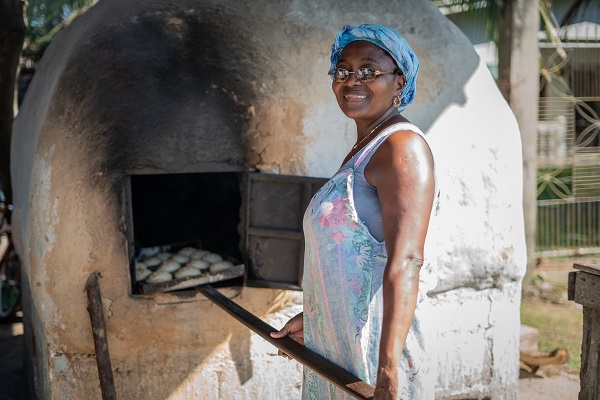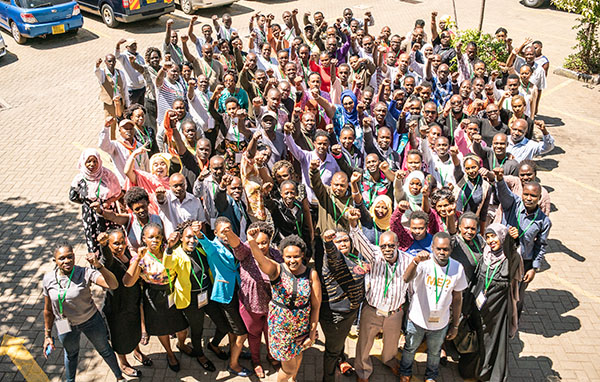This article was published more than 4 years ago.
One year ago today, the World Health Organization declared COVID-19 a global pandemic. In countries around the world, schools closed, offices went remote, and governments issued lockdown orders to curb transmission of the novel coronavirus. While many aspects of life have changed interminably, the human rights movement has remained steadfast: hundreds of local activists and groups supported by the Fund have found creative, agile ways to protect their communities, promote fundamental rights, and save people’s lives.
The pandemic has exacerbated existing injustices and inequalities. And marginalized people everywhere have borne the brunt of the impact. But time and time again, the activists we support have met the moment. With their help, communities around the world have been able to endure the pandemic, while still tackling the critical issues that continue to threaten people’s rights.
Securing Daily Essentials

The COVID-19 pandemic has worsened another global crisis—hunger. It’s estimated that the number of people who lack access to nutritional food has increased to over 270 million due to COVID-19. Fund-supported groups like OFRANEH (Organización Fraternal Negra Hondureña, or Honduran Black Fraternal Organization) in Honduras are ensuring their communities have access to nutritious food. OFRANEH turned to a long-standing tradition of communal eating to prevent hunger in coastal Afro-Indigenous Garifuna communities, creating a model that would be used in other parts of the country.
In India, sex workers have faced a dual threat: a loss of income and the compounding effects of stigma, which often prevent them and their families from accessing aid. In response, Fund-supported SANGRAM (Sampada Grameen Mahila Sanstha), an organization led by sex workers, worked to secure rations for families and advocate for their rights. Months into the crisis, they secured a huge victory in Maharashtra State, where local government issued a directive for sex workers to receive essential services and free rations during the pandemic.
In Uganda, climate justice advocates NAPE (National Association of Professional Environmentalists) leveraged emergency support from the Fund and other organizations to not only keep their community radio station broadcasting but to transform it into a hub for COVID-19 information and resources. When they learned about a spike in human rights violations at the hands of security forces, NAPE also created programming around rights education and how to report abuses.
Along Myanmar’s border with Thailand, thousands of Karen people live in internal displacement camps. The government has largely excluded ethnic minorities like the Karen from their COVID-19 response efforts. One of the leading advocates for Karen rights and needs, the Fund-backed Karen Women’s Organization (KWO), has stepped in to supply clean water, food, and translated health information.
Protecting Civil Liberties

Under the guise of pandemic response, authoritarian regimes have introduced legislation and pushed policies that advance their agendas, increase their powers, and restrict freedoms of assembly and expression well beyond the current health emergency. Fund President and CEO Regan Ralph discussed this alarming trend with Global GoalsCast and Program Officer James Savage shared the vital role that grassroots human rights groups play in pushing back with OpenDemocracy.
In Nigeria, a proposed law that would have expanded police powers and increased surveillance even beyond the pandemic was tabled, thanks in large part to a coalition of human rights groups led by Fund-supported Spaces for Change, a local watchdog organization.
Protecting human rights activists is an integral part of the Fund’s approach, and this has only become more critical during the pandemic. Corrupt officials, organized crime, and other abusive forces have been empowered by lockdown laws or a lack of oversight to constrain, arrest, or attack activists. Meanwhile, human rights defenders have faced a loss of livelihood with their work interrupted or suspended. In Kenya, Fund-supported networks such as the Defenders Coalition have worked together to meet activists’ health, safety, and economic needs.
Throughout 2021, the Fund is aiming to support 100 grassroots justice groups across the globe, who are delivering urgent humanitarian relief and building long-term systemic change into recovery efforts. Learn more about the COVID-19 Grassroots Justice Fund and donate today to help community activists with innovative solutions for driving equality and justice.


